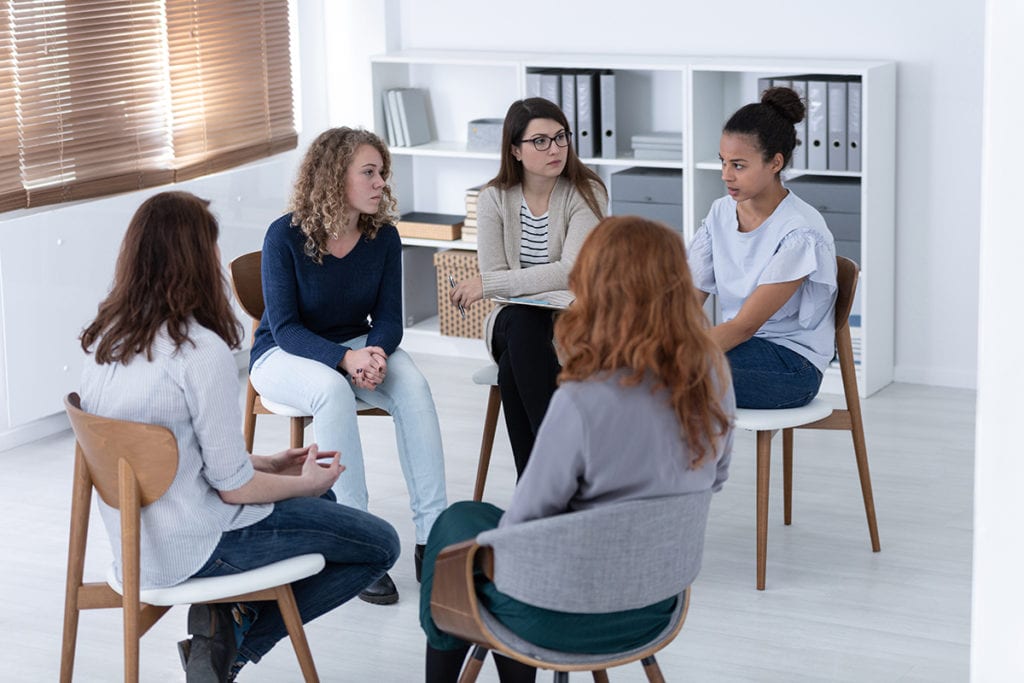Counselors often recommend group therapy for individuals seeking recovery during an addiction treatment program. You may be wondering if group therapy techniques work if you’ve ever done group therapy before. The answer depends on several different factors. Much of the outcome depends on you and your willingness to participate because group therapy can differ from place to place and group to group.
What Happens in Group Therapy?
As soon as you hear the words “group” and “therapy” together, you might start to feel a bit nervous. After all, your addiction isn’t something that you necessarily enjoy talking about with people you don’t know. However, during addiction therapy in Worcester, Massachusetts, therapists create an environment of compassion and open sharing. As you participate in therapy, you begin to trust the people around you and work together towards recovery. The openness and respect cultivated in therapy groups help you conquer fear and self-doubt. So there’s no need to fear group therapy because you won’t be in there with a roomful of strangers.
In group therapy, you will take turns along with the other group members in sharing some of your history and current issues regarding your addictions. This is an effective way to realize that you are not alone in being addicted to something that’s causing problems in your life. Not only is it therapeutic to talk out loud about your struggles. Communication helps you find other individuals just like you who struggle with the same kinds of issues. In a nutshell, basically, what happens in group therapy is that the members of the group participate in group activities as well as engage personally in the group setting.
What Are Some Common Group Therapy Techniques?
The kinds of group therapy techniques that you encounter will ultimately depend on the needs of the individuals in the group. During an inpatient addiction treatment program, intensive groups help you focus totally on your needs for early recovery. In an outpatient setting, like a Partial Hospitalization Program, therapy enables you to process your return to everyday life and establish healthy coping skills you will need for day-to-day living. In general, though, here are some of the most common group therapy techniques that are used.
Mask Building
In this activity, the group members are asked to draw a mask of how they feel inside. The mask may be drawn on a paper plate or something else. So if on that particular day you are feeling shy, you’d draw a face with a shy expression. Then the group members take turns holding up their masks while others react to the expressions. This group therapy technique helps members see how different expressions sometimes evoke surprising reactions from the rest of the group.
Role-Playing
There is a little bit of play-acting in this group therapy technique. One member plays the part of another member’s friend or family member. The person not acting then has a chance to tell that “actor” exactly how they’re feeling or what they think about how they are treated. This group therapy technique is useful for helping members express repressed feelings in a safe environment. Often, there’s a kind of enlightenment as a member suddenly realizes they are resentful or hurt about something another person is saying or doing to them.
Writing Stories
Finally, another commonly used group therapy technique involves storytelling. After a prompt from the group moderator, the members of the group then finish off the story as they feel it should go. Then they read what they wrote to the rest of the group. This is another excellent way to unearth hidden feelings and emotions. Often, the group moderator allows other group members to comment on the stories in a helpful manner. This enables the member who wrote the story to listen to comments and decide if they ring true or not.
Find Group Therapy Today
Getting addiction treatment in a group setting can be very scary, but at the same time, it’s very liberating. A person can have an altered view of themselves and reality when they are suffering from addiction. Getting constructive feedback from other members of the group often helps ground the person and take the veil from their eyes.
At Washburn House in Worcester, Massachusetts, we use group therapy alongside other evidence-based addiction therapies. We also offer holistic treatment, including yoga therapy for addiction, that provides for total healing, including the mind, body, and soul. If you’re interested in attending group therapy or you have some questions about getting help for your addictive behaviors, please give us a call at 855.298.3104. We’re here to help.

